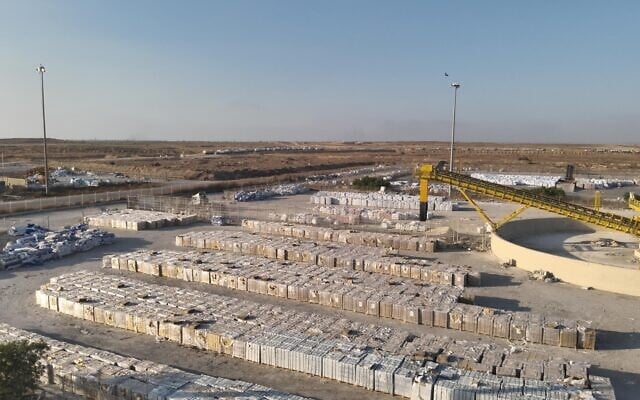Amid claims by Hamas of unprecedented starvation in the Gaza Strip in recent days, a senior Israeli security official says that the military has not identified famine, but stresses that actions need to be taken to “stabilize the humanitarian situation.”
The official, speaking with reporters on condition of anonymity, acknowledges that recently there has been a significant drop in the amount of aid reaching civilians in the Strip, blaming United Nations bodies for not collecting and distributing the food and supplies.
The Coordinator of Government Activities in the Territories, the Israeli military and defense ministry body responsible for coordinating aid deliveries to Gaza, says that some 950 trucks worth of supplies are waiting to be collected by the UN from the Palestinian side of the Kerem Shalom and Zikim crossings.
???? WATCH: 950 trucks worth of aid, currently waiting in Gaza❗️for international organizations to pick up and distribute to Gazan civilians. This is after Israel facilitated the aid entry into Gaza.
— LTC Nadav Shoshani (@LTC_Shoshani) July 22, 2025
The official says that the aid waiting at the crossings for collection alone is enough to supply the Strip’s food needs for two and a half weeks.
“We have not identified starvation at this current point in time, but we understand that an action is required to stabilize the humanitarian situation,” the official says, adding that there may be difficulties with accessibility to food in some areas.
The official says that COGAT has sat down with the UN to try and work out the deliveries of the mounting aid that has been allowed into Gaza but not distributed.
The official says there are no issues with the aid reaching the crossings and entering Gaza, but the main bottleneck is the distribution itself. During the recent meetings, the official says it was agreed that the UN would distribute 70-80 trucks today, but in practice only 30 were taken in.
The UN has repeatedly claimed that COGAT has refused their requests for collection and distribution authorization, and that dangerous and complex conditions inside Gaza made aid distribution very difficult.
According to the UN, Israel’s restrictions and permit rejections are the reason for the mounting stockpiles of aid at the crossings, as aid organizations are regularly barred from transferring aid to warehouses and distribution sites. Convoys that don’t coordinate their travel with Israeli authorities and obtain hard-to-obtain approvals come under deadly IDF fire.

The official says that the UN has made requests that COGAT cannot agree to with regard to the deliveries, such as demanding that Hamas police escort the convoys, or that they be allowed to bring in communication devices that Israel fears could end up in Hamas’s hands.
Regarding the famine claims, the official says that Hamas is taking advantage of the humanitarian situation in Gaza and carrying out a propaganda campaign as part of a pressure tactic amid the ongoing hostage negotiations: “This is a cynical and timed move aimed at creating international pressure on Israel,” the official says.
The official says Israel is able to determine that there is no widespread famine in Gaza based on how much aid is actually entering the Strip, along with speaking with Palestinians and other intelligence.
In the past two months, some 4,500 trucks of aid have entered Gaza, according to COGAT. Half of those trucks have headed to the Gaza Humanitarian Foundation aid distribution sites, while the other half were taken to warehouses belonging to the UN and other approved aid organizations. In the past month, an average of 71 trucks entered Gaza each day, COGAT says.
Still, the official says that nearly all of the aid trucks heading to the UN warehouses were looted by Gazan mobs, not Hamas.
Since the resumption of aid deliveries to Gaza on May 19, after a pause since March 2, Israel has established a new mechanism to prevent aid trucks from being taken over by Hamas, the official says.
The mechanism only allows for international aid bodies that are registered with Israel’s Diaspora Affairs Ministry to bring aid into Gaza, after rigorous security checks at the crossings. The mechanism also places sanctions on aid groups and individuals who do not abide by Israel’s requirements.
The official says Hamas is trying to do everything it can to undermine the new aid mechanism, including the GHF distribution sites. International organizations have said that Israel’s refusal to name a viable alternative to Hamas has created a chaotic and desperate situation on the ground that has significantly marred aid distribution.

